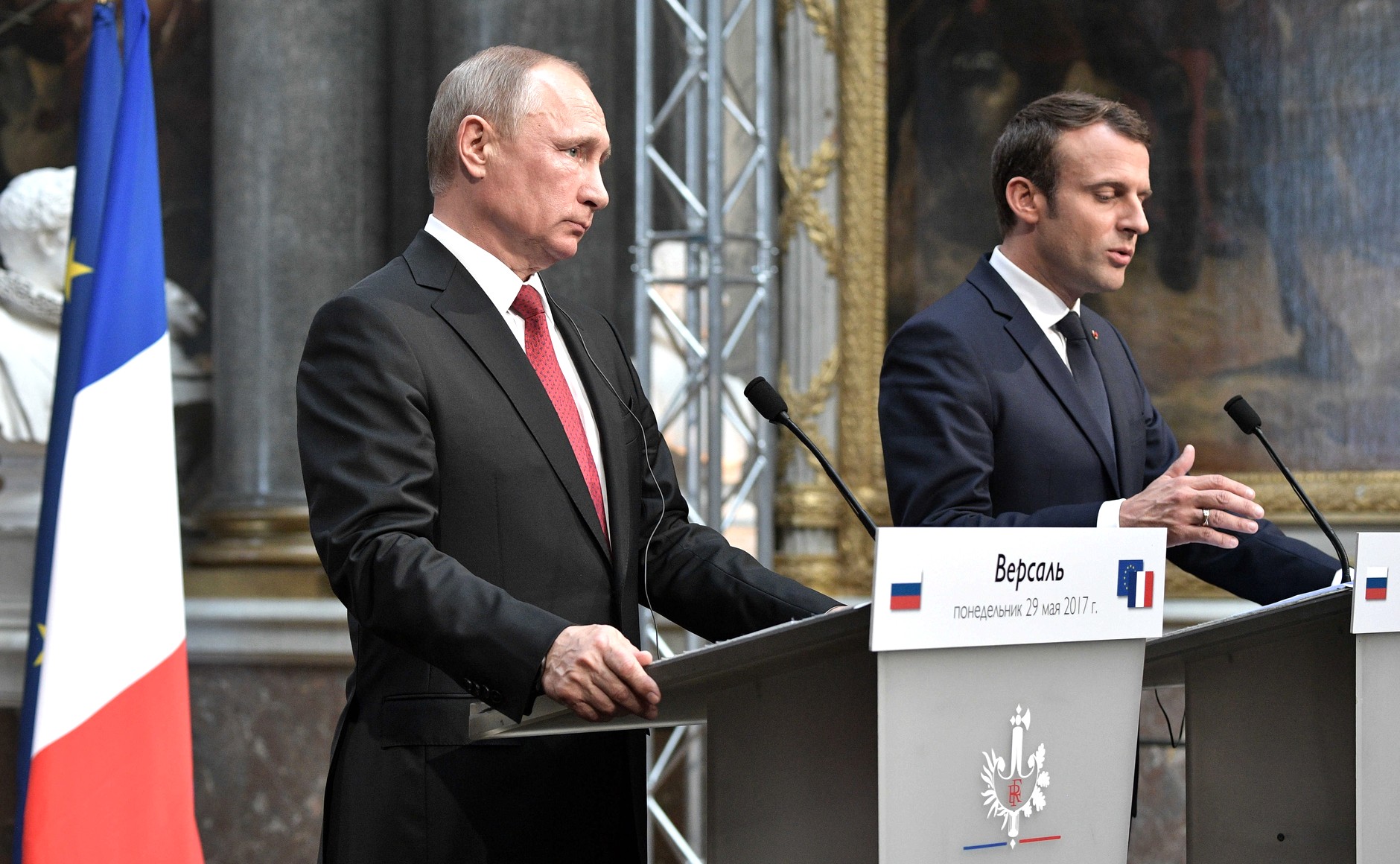A nation must think before it acts.
France once again is pushing for improved relations with Russia. For that to happen, Moscow would have to make major concessions, given its forcible change of European borders in 2014. While it may seem unlikely, particularly at the height of the COVID-19 pandemic and during a U.S. election year, the shape of such a grand deal isn’t too difficult to flesh out—and the benefit of reduced tensions between Moscow and the West may be worth the effort.
So far, French President Emmanuel Macron’s efforts to engage Russian President Vladimir Putin and negotiate with Russia have yielded little in the way of results. For this reason, the European Union will soon approve another six-month extension of sanctions on Russia.
Macron claims that these sanctions aren’t working, and he’s both right and wrong. Certainly, they haven’t caused Moscow to relinquish control of Crimea or end the intervention in the Donbas. Nonetheless, the sanctions—along with lower oil prices—have hurt the Russian economy. In part as a result of economic stagnation, Putin’s popularity has taken a hit, unhelpful at a time when he hopes to remain in office until 2036.
If the West agreed to end the sanctions, would Putin agree to return Crimea to Ukraine? Probably not. But would Putin at least agree to leave the Donbas? Maybe so. But such an exchange—ending Western sanctions in exchange for Russia’s withdrawal from the Donbas—wouldn’t be an equal one for the West. Acquiescing to Russia’s annexation of Crimea, even with Russian forces out of the Donbas, wouldn’t justify ending sanctions.
To achieve progress and get the West—much less Ukraine—to look the other way when it comes to Russia’s annexation of Crimea, Moscow would have to sweeten the deal significantly. Specifically, the West could suggest that Moscow denuclearize Kaliningrad, its exclave on the Baltic Sea sandwiched between Poland and Lithuania. Denuclearization would need to include the withdrawal of all mobile Russian intermediate range missiles. To enforce this, Moscow would need to permit on-site inspections.
Although reducing tensions in Eastern Europe would need to start with Kaliningrad, it would also have to include other measures to increase stability and security. For instance, Moscow would need to stop violating the airspace of NATO allies and regional partners. It would need to end short-notice, large-scale exercises in areas near NATO, return to full compliance with confidence-building treaties it signed long ago, and stop and reverse its buildup of warships in the Black Sea.
Finally, even though there’s strong public support in Ukraine for ending the war in the Donbas, Kyiv is unlikely to get on board unless Moscow accedes to Ukraine’s desire for closer political, economic, and military ties with the West. Therefore, Russia would need to verifiably end its support for the separatists in the Donbas and acknowledge Ukraine’s sovereignty in choosing its international relationships.
All of this sounds fantastically impossible today, but there are several reasons why offering the Russians a roadmap isn’t so crazy. First, it has become increasingly obvious Russia is unlikely to relinquish Crimea, and Crimeans appear accepting of Moscow’s rule. While Kyiv and the West need to come to terms with this geopolitical reality, they’d be foolish to roll over without getting something in return. The West ought to be explicit on its price.
Second, the impact of sanctions and Russia’s flailing economy may make Moscow increasingly more willing to negotiate a way out of the impasse. To do so, Moscow needs to understand what it will take to get the West and Ukraine to swallow the bitter pill of accepting the Russian annexation of Crimea. It’s admittedly a high bar, but Moscow needs to know how high.
Third, Western solidarity toward Moscow has long depended on offering Russia an open hand as well as a clenched fist. Dialogue and defense together formed NATO’s two-track path to security and stability throughout its history. As the West increases defense spending and strengthens its military posture, it must simultaneously offer Russia a path forward. Otherwise, what today appear as minor fissures in Western unity could gradually become unbridgeable divides.
To be clear, this is not just another Western reset with Moscow, which is a nonstarter in any case given President Donald Trump’s complex relationship with Russia. None of what’s been suggested will address the ongoing hybrid war waged by Russia against the West, including media manipulation, election interference, aggressive cyber-attacks, and politically motivated assassinations. The West should continue to defend itself, strike back when and where appropriate, compete with Moscow across all domains, and reduce Russia’s ability to threaten vital interests.
Just as arms control treaties of the 1970s and 80s didn’t end spying between the United States and the Soviet Union or their proxy fights across the globe, solving the Ukrainian puzzle won’t turn Putin into a friend, or even a partner. Nonetheless, a more broad-based Western effort – beyond Macron’s unsuccessful initiative – to broach what it might take to reach a deal to reduce the risk of the most catastrophic security scenario in Europe is in the interests of both sides.
The views expressed in this article are those of the author alone and do not necessarily reflect the position of the Foreign Policy Research Institute, a non-partisan organization that seeks to publish well-argued, policy-oriented articles on American foreign policy and national security priorities.




